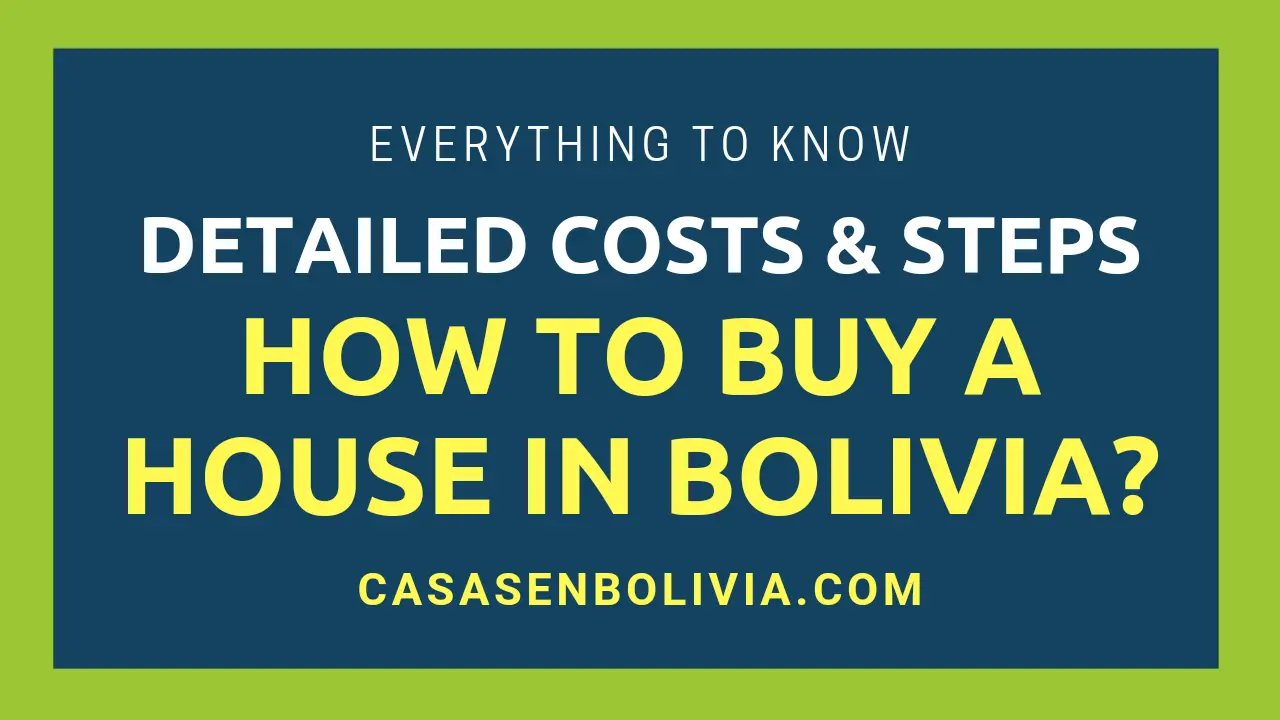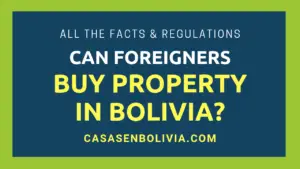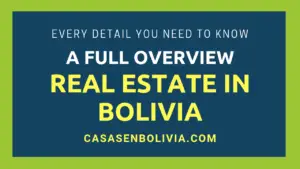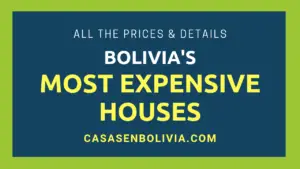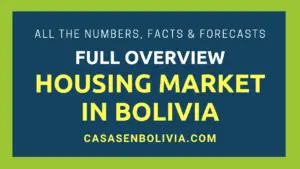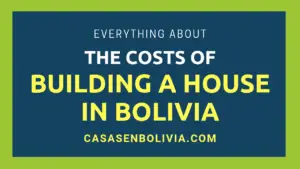Last Updated on February 15, 2025
Buying a house in Bolivia is riskier than you might think, but it can also be very profitable, as property values here tend to appreciate consistently. You have several options for buying a house in Bolivia, such as purchasing from major banks, working with internationally recognized realtors, or navigating the process independently. It’s crucial to consider the risks involved, as buying property in Bolivia often requires greater legal diligence than in other countries.
To buy a house in Bolivia, you need to: 1) understand the laws governing real estate in the country, 2) obtain at least temporary residency, 3) sign the sales contract before a notary public, 4) pay the required taxes to the local government, and 5) register your ownership with the “Derechos Reales” entity.
Here, we’ll discuss all the steps and legal procedures you need to follow to purchase a house as a foreigner in Bolivia. We’ll also describe in detail the risks involved. Finally, we’ll outline the best options, considering both safety and price, for buying a house in our country. We are Bolivian real estate experts.
Warning: Risk of Scams When Buying a House Here
Our advice: Exercise extreme caution when buying a house in Bolivia. You genuinely need to understand how things work here and the potential threats you’ll face. There are significant risks and challenges you’ll need to navigate.
This advice might seem excessive to some, but as Bolivians, we’re simply being honest with you. This isn’t a country where foreigners enjoy the same legal protections and ease of process as they might in developed countries, or even in some other South American nations.
While foreigners are generally treated well here in a tourism context, the situation is different for more serious matters like real estate. Bolivia doesn’t offer the same level of support to individual foreigners. This might be different for multinational corporations establishing operations in Bolivia, *but not for an individual acting alone without the backing of a company*.
Bolivian Laws and Public Institutions Don’t Always Adequately Protect Foreigners
As mentioned, this isn’t because Bolivians dislike people from other countries; it’s more a reflection of *how laws and public institutions function in Bolivia*. It’s also a consequence of the large number of informal (unlicensed) individuals working in the real estate sector, *many of whom provide poor service* even to Bolivian clients.
And that’s not the worst of it. Bolivians themselves are very wary of being scammed by lawyers and informal real estate agents. If this is the situation *for Bolivians*, imagine how it could be for foreigners who may not speak Spanish and are unfamiliar with local customs and laws.
This is why we strongly recommend that you *exercise extreme caution when buying a house in Bolivia*. You could end up losing a significant amount of money and time. You could be scammed out of tens of thousands of dollars and spend months, a year, or even longer trying to rectify a poorly executed property purchase.
If you’re considering investing in Bolivian real estate, we won’t mislead you – there are opportunities. However, many other countries in the region offer similar opportunities *with clearer laws and procedures* for foreign investors. Bolivia’s legal system isn’t as robust, and you need to master the legal aspects of real estate here first. We’ll discuss these precautions in more detail later in this post.
You Can’t Buy a House in Bolivia as a Tourist
Remember, you cannot buy a house in Bolivia unless you are at least a temporary resident and possess a foreigner’s ID card. This means that as a tourist, you are not permitted to purchase property.
Obtaining temporary or permanent residency also grants you a foreigner’s ID. This document provides you with the same rights enjoyed by Bolivian citizens, allowing the Bolivian Constitution to protect you, as it states: *both Bolivians and legal residents from other countries have equal rights*. To achieve this status, you must be a “legal resident” and have your foreigner’s ID.
However, the challenge lies here: as a tourist, you cannot simply obtain temporary residency. You need a valid reason to become a temporary resident of Bolivia. These reasons may include:
- Employment purposes.
- Health-related reasons.
- Educational purposes.
- Being part of a diplomatic mission or international organization operating in Bolivia, and being employed by it.
- Having a Bolivian parent.
- Marriage to a Bolivian citizen.
- Tourism is not a valid reason.
This is a significant hurdle when attempting to buy a house in Bolivia, as you must first become at least a temporary resident. Obtaining this status is difficult for the reasons mentioned above. You can’t simply become a temporary resident without a legitimate reason; you need to establish that reason first.
However, once you obtain your foreigner’s ID, you are essentially treated like any other Bolivian, acquiring equal rights in all matters, including real estate transactions.
So, How Can You Safely Buy a House in Bolivia?
The Only Method We Recommend for Safe Purchase
There’s a reliable way for you to purchase a house without exposing yourself to the numerous risks this country presents, *and that’s by buying from the major banks*. We strongly recommend this approach because it’s highly secure and often more affordable, as you’ll typically *receive a 20% discount* off the appraised value.
The steps to safely buy a house in Bolivia from major banks are:
- Search for a house currently in an auction process or one acquired by a bank after a foreclosure.
- To find properties in these situations, consult our dedicated article, where we list all the sources and details.
- Contact the bank responsible for the auction. Use the contact information provided in the listing, or call the bank’s main number, and they’ll direct you to the appropriate employee.
- You’ll need to either come to Bolivia or have a legal representative to handle the auction process and paperwork on your behalf. The bank listing the property can assist you and guide you through this process. We recommend that you personally come to Bolivia and manage the auction purchase yourself.
- You’ll need to pay for the house in full. Once you win the auction, you’ll be required to pay the entire auction price without financing. Remember that you can potentially acquire houses with a 20% discount in Bolivian auctions; this is the maximum discount allowed by law.
- You’ll receive ownership of the property with the assistance of Bolivian legal professionals and the bank’s guarantee. This last point is crucial for avoiding potential scams and associated risks in the buying process.
The key advantage of this procedure is that you’ll be buying the house at auction from a foreclosure process, ensuring the support and guarantee of major Bolivian banks, along with a potential 20% discount.
These institutions will review the property’s documentation, verify the current owner’s legitimacy, and even handle some of the legal paperwork for you, guiding you through the legal process. Bolivian banks are very reputable institutions; you can trust them.
There’s also the possibility of purchasing the house *with a mortgage from a major bank*. However, to pursue this option, you must be a permanent resident with a stable income. Banks are very cautious when approving loans for foreigners. Bolivian law doesn’t prohibit banks from providing loans to foreigners.
Precautions to Take When Buying a House in Bolivia
There’s no equivalent to Title Insurance in Bolivia to secure real estate transactions, as there is in the United States. Therefore, when you buy property in Bolivia, you do so at your own risk. It’s essential to be extremely careful about the risk of fraudulent titles and documents.
The most important precautions you should take to avoid potential scams and similar risks are:
- Purchase a house from banks through foreclosure processes and auctions. This is by far the safest and easiest option for foreigners, and you’ll often receive a 20% discount on the appraised value.
- Purchase a house with the assistance of Bolivia’s two major real estate companies, ReMax and Century 21. We recommend only these two companies. Other realtors in Bolivia are generally not as reliable, and you risk working with a fraudulent agent.
- Obtain the best possible legal assistance in Bolivia. If you intend to handle the legal buying process yourself, you do so at your own risk. However, you can find reliable lawyer referrals from:
- Your own embassy.
- Major banks in Bolivia.
- We don’t recommend other sources for referrals. Be extremely cautious with Bolivian lawyers; many may attempt to take advantage of you or even involve you in serious legal difficulties.
- Engage multiple legal advisors, at least three (*none of whom should know each other*), so they can independently review the property’s paperwork and the legal buying process.
- Only real estate sales contracts executed before a notary public are valid under the Bolivian legal system. Never purchase a house with only a private sales contract!
- Register your property ownership with the Bolivian institution “Derechos Reales.” This is the ultimate authority that registers all real estate transactions in Bolivia. You must register your ownership here to definitively secure your legal right to the property.
- We have a guide in Spanish about the paperwork involved in buying a house in Bolivia. You can access this guide here (Translated: Link). While this guide is written for Bolivians, you can gain valuable insights from it.
The precautions listed above are only the most crucial, not exhaustive. You should consult our Spanish guide for a more comprehensive understanding of the precautions to take when buying a house in Bolivia independently. Nevertheless, always seek the best possible legal counsel and engage multiple advisors (each reputable legal professional should cost between $50 and $100 for their services; these are the typical fees for Bolivian clients).
Remember also that you cannot purchase and own agrarian or rural land (property outside urban areas) in Bolivia; this is prohibited by law. Additionally, you cannot purchase any property located within the 50 km (approximately 31-mile) border zone.
Pre-Planning Steps to Buy a House in Bolivia
Now, we’ll outline how to buy a house in Bolivia. However, please carefully consider the advice provided at the beginning of this article. Remember, we’re not just offering casual opinions; we’re experts in the field, with a well-established Bolivian Spanish website, CasasenBolivia.com, that guides Bolivians through real estate transactions and activities in Bolivia.
With that said, let’s proceed.
Before buying a house in Bolivia, you need to take some preparatory steps to ensure everything is in order for the purchase process. Most of the steps are the same as those for Bolivian citizens, but some differ slightly:
- Familiarize yourself with the laws and regulations governing real estate in Bolivia.
- Understand the socioeconomic situation in Bolivia.
- Arrange a trip to Bolivia to handle matters personally.
- (Not recommended) Designate someone in Bolivia to manage the buying process on your behalf.
a) Familiarizing Yourself with Bolivian Real Estate Laws and Regulations
Various laws and regulations govern real estate for foreigners in Bolivia. We’ll outline the most important ones here. Here’s a list of the key laws you should consider when planning real estate transactions in Bolivia:
- Constitution of the Plurinational State of Bolivia (Translated: Link).
- Bolivian Immigration Law (Law No. 370. Translated: Link).
- Agrarian Reform Law (Translated: Link).
Constitution of the Plurinational State of Bolivia
Bolivia’s most important law, the State Constitution, indicates that foreigners have the same rights as native-born citizens, but with some restrictions relevant to real estate.
The most significant real estate regulations in Bolivia’s State Constitution are:
- Article No. 262 states that no foreign person can own any type of property within the 50 km (approximately 31-mile) border zone.
- Article No. 357 states that no foreign person can own or register in their name any Bolivian natural resources, such as metal mines, oil or gas wells, stone quarries, and similar resources.
- Article No. 396 states that no foreign person can acquire or purchase any type of rural or agrarian property from the government.
The first article is quite old and likely stems from concerns about national sovereignty.
Beyond these three general regulations, individuals from other countries have the same rights as native Bolivians regarding almost all real estate matters.
Bolivian Immigration Law (Law No. 370)
Bolivia’s Immigration Law is crucial if you intend to conduct real estate transactions independently or live in Bolivia.
There are three primary residency statuses in Bolivia, each with unique aspects:
- Transitory Stay. Remember, you cannot purchase a house in Bolivia without at least temporary residency. To buy a house, you need a foreigner’s ID card (mandatory), which grants you all the rights Bolivians enjoy. However, this document can only be obtained if you are at least a temporary resident.
- Temporary Residency. This status authorizes you to stay for up to three years, but it also comes with some restrictions. For example, you cannot leave the country for extended periods (e.g., months) without permission. If you plan to stay in Bolivia for a long time without becoming a citizen, this might be a suitable option.
- Permanent Residency. This is the naturalization path, requiring you to become a Bolivian citizen. While it’s possible to stay longer than three years without becoming a citizen, obtaining citizenship is the best way to avoid extensive paperwork for various services and benefits. If you intend to become a Bolivian and need to purchase a home or other real estate for long-term residency, this could be your best choice.
We have an in-depth guide on how immigration laws work in Bolivia, how foreigners can enter, stay, live, and depart following these regulations, and all the related details. You can access this guide here: [Link ]
Agrarian Reform Law
This law governs numerous aspects of agrarian or rural land and agricultural activities in Bolivia. It also contains significant regulations affecting foreign individuals and entities. Most importantly, *Bolivian owners of rural land are prohibited from selling or renting their rural properties to foreign individuals or entities*.
All the regulations in the Agrarian Reform Law that impact foreigners and their real estate rights are found in Article 46:
- Article No. 46 (I) states that no foreign government, entity, or corporation dependent on it can own any type of rural property in Bolivia.
- Article No. 46 (II) states that foreign individuals and entities are prohibited from owning any type of property within the 50 km (approximately 31-mile) Bolivian border zone. *This article also prohibits Bolivians from selling or renting rural land to any foreign individual or entity.* However, this subsection allows Bolivian owners to enter into shared-risk contracts with foreigners for agricultural production on rural lands.
- Article No. 46 (III) states that foreigners cannot acquire or purchase any type of rural property from the government.
- Article No. 46 (IV) states that to enter into shared-risk contracts, foreign individuals must have at least permanent residency in Bolivia, and foreign entities must have authorization to conduct agricultural activities in Bolivia (*though the process for obtaining this authorization is not specified!*).
b) Understanding the Socioeconomic Situation in Bolivia
Generally, Bolivia has a historically positive track record for real estate. Most properties and houses in urban areas have consistently *appreciated in value* over time, resulting in increased equity.
This situation is primarily due to three factors:
- A continuous migration of people from rural areas to cities, leading to urban growth and increasing property values within cities.
- Bolivia’s high birth rate, which is not expected to decline significantly in the near future, creating ongoing demand for housing.
- Bolivia’s consistently high GDP growth rate, enabling more people to afford their own homes.
In Bolivia, it’s a general trend that property values increase over time, often reaching two to three times their initial price after 10 to 15 years (an average equity gain of 1.5 times in 5 years). However, to realize these gains, you need a *thorough understanding* of the Bolivian real estate market.
To achieve this level of appreciation, *you need to know where to buy*. For example, purchasing in the center of a major city like Santa Cruz might not yield the same gains as buying near the outskirts of urban areas, where properties generally appreciate more rapidly over time. *Ensure you are well-informed before making any decisions.*
The Political Situation in Bolivia
We recently had presidential elections (October 18, 2020), and there’s considerable speculation about how the new government will impact Bolivia’s socioeconomic structure. While there’s a general sense of optimism, *a minority of the population* fears potential financial and economic instability in the medium term.
As you may know, property values in Venezuela have plummeted, currently costing between 10% and 20% of their value just a decade ago. *We don’t intend to cause alarm*; it’s unlikely that a similar situation will occur in Bolivia. However, it’s crucial to monitor this closely, as you could potentially lose a significant amount of money on your property investment if Bolivia experiences a similar downturn.
If you’re planning to purchase property in Bolivia, you must carefully monitor the country’s socioeconomic and political situation. If you detect signs of instability, *you can act swiftly* to sell or transfer your properties accordingly.
Once you’ve understood the socioeconomic and political context, the Bolivian real estate market, and the relevant laws, you can choose between two options:
- Traveling to Bolivia to purchase the property yourself.
- Designating someone in Bolivia to represent you in the real estate transaction. (Not Recommended)
We’ll discuss these options in the following sections.
c) Arranging a Trip to Bolivia for a Personal Purchase
The only option we believe is truly suitable is for you to come to Bolivia and handle the process personally, with the guidance of commercial, real estate, and legal professionals. While your constant presence isn’t necessary, it will be crucial during certain stages of the buying process.
It’s highly likely that you’ll end up buying a house as a resident in Bolivia, so you’ll need to obtain one of the legal residency statuses available, which we described in the section above.
Is it Possible to Delegate the Buying Process to Someone Else in Bolivia?
Under no circumstances should you entrust someone else to handle this for you in Bolivia. This is due to two primary reasons:
- There’s no legal framework to support foreigners delegating property-related paperwork in Bolivia. You cannot grant power of attorney to a Bolivian representative; there’s no Bolivian law addressing this. The only way to do this is if you were a company. To pursue this route, you’d need to establish a legal business in Bolivia. As an individual, however, you won’t have any legal support for granting power of attorney or a similar arrangement. While Bolivian law theoretically applies equally to Bolivians and foreigners, this isn’t always the case in practice. Foreigners often don’t receive the same treatment as Bolivian citizens.
- You’d be at a high risk of being scammed. Many individuals might believe that, as a foreigner unfamiliar with the country, they can take advantage of you, and many will attempt to do so if given the opportunity. Therefore, it’s simply a matter of chance whether you encounter a dishonest professional. This risk is significantly amplified if you informally delegate the process. If something goes wrong, *in many cases, no public institution or law will be properly enforced to protect you*. You’ll likely face even worse challenges than Bolivians typically encounter with the legal system, including lawsuits that can drag on for years, corruption, bureaucracy, and similar issues. This isn’t an exaggeration; it’s what we observe daily in Bolivia. Public institutions and the government often perform their duties even less effectively for foreigners in these situations. If you lose money, it’s highly probable that you won’t recover it. Furthermore, there’s no equivalent to “Title Insurance” in Bolivia.
Before even considering buying a house in Bolivia, you must complete this stage and obtain all the necessary documents for a foreigner. For example, you’ll need to obtain your immigration card (carnet de extranjería), your visa for foreign immigrants (visa para migrante extranjero; there are different types), etc.
If you want to know how to complete all the legal paperwork to visit or immigrate to Bolivia, either as a tourist or a resident, and understand all the details, visit our comprehensive guide on this topic: [Link]
The 5 Legal Steps to Buy a House in Bolivia
Once you’re in Bolivia, you’ll need to closely monitor the legal steps of buying the house, even if you’re following the process we outlined at the beginning of this article.
We do not recommend that you handle these steps independently *unless you have extensive knowledge of the local system*. It’s a complex and risky process (as many people are scammed during this stage) that can take between two and six months to complete.
It’s far better to seek professional assistance from various experts, such as a real estate company, a lawyer, a construction company (for the appraisal), a bank (for financing and legal assessment), etc.
However, you should still understand what the realtor and real estate agent will be doing to transfer ownership of the property to you. Therefore, we present the steps that a person living in Bolivia typically takes to legally acquire a home.
These steps are:
- Draft a contract.
- Elevate it to a public deed.
- Complete the paperwork with the city government.
- Register the property in “Derechos Reales” under your legal name.
- Arrange for someone to care for your house.
1) Drafting a Contract
You’ll need to reach an agreement on a purchase contract to legally buy the house. *This contract must be drafted by a lawyer specializing in real estate*. As we’ve emphasized, there’s a very high risk of being scammed by some professionals in this field in Bolivia if you’re a foreigner.
Therefore, we strongly recommend that you only seek referrals for reputable lawyers *from major Bolivian banks*. These institutions work with highly ethical and skilled legal professionals because they need to approve numerous loans and mortgages for their clients.
So, simply ask these banks, perhaps with the assistance of translation services, if they can provide you with references for reputable and professional lawyers in Bolivia with whom they regularly work.
You might also obtain reliable lawyer referrals from the two major real estate companies in Bolivia, ReMax and Century 21, but their referrals may not be as consistently reliable as those from major banks.
In summary, request referrals for reputable lawyers from Bolivia’s major banks, specifically those they regularly engage for their services.
Additionally, it’s wise to hire more than one lawyer (*three different ones is a good approach*) and have them independently review the contract you’re about to sign to identify any potential issues or irregularities. Having these three lawyers assist you simultaneously throughout the entire sales process would be even better.
2) Notarizing the Purchase Contract
You’ll need to bring this purchase contract to a Bolivian notary public. This professional will sign the contract to make it publicly available and legally binding.
The notary public will review all documents and the contract before signing. This professional may identify legal issues or irregularities in the contract or supporting documents. Therefore, it’s crucial to find a highly competent notary public to thoroughly examine all the paperwork related to the house.
3) Completing Paperwork with the City Government
After signing and notarizing the contract, you’ll need to complete some paperwork with the local government of the city where you’re buying the house. You’ll need to obtain various documents and pay taxes at this public institution, such as:
- The cadastral certificate.
- The land use plan.
- Municipal taxes.
- Etc.
4) Registering the Property in “Derechos Reales” Under Your Name
“Derechos Reales” is the government institution that records all Bolivian real estate properties. To legally own a house in Bolivia, you must register your property under your name with this institution.
If you fail to register your home with this institution, the house won’t be legally yours. In the eyes of the government, it won’t belong to you, and any unscrupulous individual could potentially claim it. Failing to complete the proper paperwork at this stage can lead to significant complications; we assure you it will be a very difficult situation to resolve.
You might even be unable to rectify issues with the paperwork, forcing you to abandon the process. Therefore, to reach this final stage of buying a house in Bolivia, you must have meticulously followed the previous steps to minimize complications when registering your house with “Derechos Reales.”
5) Arranging for Someone to Care for Your House
After successfully purchasing the property, you might be returning to your home country or traveling between the two countries regularly. Therefore, you’ll need to arrange for someone to care for your house.
How to Do This?
It’s crucial to understand that Bolivian law allows individuals caring for a home to potentially become the legal owners if certain conditions are met. For example:
- Bolivian Law No. 247. If a housekeeper lacks a legally signed home care contract, after residing in the house for only five years, they can claim ownership.
- Bolivian Usucapion Law. This law allows a person caring for a house to claim ownership after 10 years of residence, *if* there’s no legal contract establishing their tenancy *and* if the legal owner doesn’t assert their rights before that time.
Therefore, you must sign a Bolivian legal home rental contract that has been formalized as a public deed. This ensures that the person caring for your house is legally residing there, significantly reducing the risk of losing your property in the future.
For comprehensive details, we have a complete guide on how to rent a house in Bolivia, including instructions on creating a legal home rental contract.
The Fraud Rate in Bolivia is Very High
In Bolivia, only about 5% of realtors, real estate companies, and agents are truly professional. The remaining 95% are, at best, amateurs and, at worst, scammers. We’ve observed this repeatedly: individuals *who appear knowledgeable about real estate* and have experience with these transactions still fall victim to scams. Even native Bolivians, who have lived here their entire lives, take the possibility of being scammed very seriously, as it’s a genuine threat.
The situation is even more precarious for foreigners, who are more likely to be targeted. Therefore, we advise you, regardless of your plans in Bolivia, *to avoid engaging questionable or unknown realtors and/or real estate agents*.
ReMax and Century 21: The Only Two Realtors Likely to Provide Reliable Service
Two major international real estate companies, ReMax and Century 21, operate in Bolivia and handle a significant volume of transactions. For instance, ReMax in Bolivia averages around 2,000 real estate transactions annually. Century 21 is smaller, averaging about 500 transactions per year.
As you likely know, these two companies are internationally recognized and respected for their professionalism. They operate globally, so don’t hesitate to engage their services. The only potential challenge is that many of the individuals working for these companies in Bolivia may not speak English fluently. You might encounter some difficulty finding ReMax and Century 21 agents who can communicate with you effectively, but once you do, you should be in good hands.
We cannot recommend engaging any other real estate companies. Many are small, local firms operating within a single major city in Bolivia (e.g., one company in La Paz and another in Santa Cruz). They are not nationwide companies, but rather regional ones. Another issue is that very few individuals working at these regional companies speak English. Therefore, communication will likely be challenging, and they are generally less professional than ReMax and Century 21.
If you have difficulty finding English-speaking agents, we recommend contacting the franchise owners of these two companies directly. They can then connect you with the appropriate real estate agent.
How to Find a Reputable Re/Max or Century 21 Real Estate Agent in Bolivia?
The good news is that both companies operate as networks and have inter-country communication. Therefore, the most effective approach is to:
- Contact ReMax or Century 21 in your home country and have them connect you with a reputable agent in Bolivia.
Any other approach is likely to be less efficient and effective. You could try calling the franchise owners of these two companies directly in Bolivia, but you won’t know who you’re contacting, and you’ll likely struggle to find someone who speaks English fluently and can communicate effectively with you.
Therefore, the best advice we can offer is to contact Century 21 or ReMax in your home country, use them as a bridge, and allow them to connect you with the most suitable agents and agencies in Bolivia.
What Are the Costs of Buying a House in Bolivia?
When buying a house in Bolivia, you’ll encounter two distinct types of costs:
- The price of the house itself.
- The transactional costs associated with the real estate operation.
1) The Price of the House Itself
House prices in Bolivia average around $150,000. You can find very modest houses for as little as $50,000 or even $30,000, at a rate of $100-$150 per square meter ($9.29-$13.94 per square foot). However, these will be located on the outskirts of cities, and, frankly, living in those areas often means limited access to even basic utilities like electricity and potable water.
You can also find very expensive houses in the city centers and prime locations, priced at $300,000 or even $500,000, at a rate of $1,000-$1,500 per square meter ($92.90-$139.35 per square foot).
The “sweet spot” for investment is in the average zones and neighborhoods of Bolivia’s major cities. In these typical areas, where most Bolivians reside *and very few foreigners*, properties typically have a price of around $150,000.
However, if you intend to live here, we strongly recommend purchasing your home in the best zones and neighborhoods of the major cities (where many expats also reside). In these areas, you’ll find houses priced between $200,000 and $500,000.
In areas like Equipetrol in Santa Cruz, Cala Cala in Cochabamba, or Calacoto in La Paz (the most desirable zones in these cities), it’s common to see houses priced around $400,000 and apartments around $100,000. Of course, houses in those areas are quite respectable, *and you’ll feel as though you’re in a small town in the US*.
The realtor will also receive a commission. ReMax or Century 21 agents typically charge between 3.5% and 4% of the house’s price, but this is usually included in the transaction. Therefore, if you’re buying a $200,000 house, the real estate agent’s commission is already factored into the price, and you don’t need to pay anything extra.
2) Transactional Costs of the Real Estate Operation
Regardless of whether you’re Bolivian or a foreigner, you must consider the transactional costs associated with any real estate purchase or sale in Bolivia. Bolivian law doesn’t differentiate between these two groups; they are subject to the same costs.
The costs you’ll encounter when buying a house in Bolivia include:
Real Estate Transaction Tax
This tax is precisely 3% of the house’s value (the purchase price). For instance, if you’re buying a property priced at $100,000, you’ll need to pay a tax of $3,000.
“Derechos Reales” Registration Fee
“Derechos Reales” is a public, government-dependent institution that *legally* registers all houses in Bolivia. Once your house is registered under your name in “Derechos Reales,” you can legally claim ownership. The registration fee is approximately $6 for every thousand dollars of the house’s price ($6/$1000). So, if you’re buying a $100,000 house, you’ll pay a fee of $600.
Appraisal Costs
Appraisals in Bolivia typically cost between 150 and 700 bolivianos ($20 – $100). However, people may attempt to charge you significantly more because you’re a foreigner, especially if you’re from a developed, English-speaking country. Be wary if someone charges you more than $250; they’re likely trying to take advantage of you. It’s a cultural norm in Bolivia to charge substantially higher prices to individuals from developed countries.
Legal Assistance Costs
Lawyers typically charge between 200 and 500 bolivianos ($30 to $70) for basic assistance services to Bolivian clients. This price doesn’t include additional services like drafting contracts, reviewing property documents, or resolving legal issues that might arise later. We strongly advise against *hiring just any lawyer in Bolivia* unless you are extremely familiar with the local legal landscape. The legal profession has one of the highest fraud rates in the country. The only places we recommend for finding referrals for reliable lawyers are 1) major Bolivian banks (as they work with highly professional lawyers to approve home loans for their clients) and 2) your own embassy.
Notary Public Fees
These fees are typically less than 500 bolivianos (less than $70) for Bolivians. Naturally, they may charge more to foreigners, but if you’re paying over $200 for the service, you’re being overcharged.
Home Caretaker/Tenant Fees
To find a potential tenant for your newly purchased house, you can engage Century 21 or ReMax again. They’ll typically charge one month’s rent, which, depending on the house, will be around $300.
You’ll also need to sign a rental contract with the tenant, and it’s crucial to have it formalized as a public deed. This will involve lawyer and notary public fees, which could range from $200 to $500, as they often charge foreigners higher rates.
Translator Costs
If you don’t speak Spanish, you’ll need to hire a translator. Translators in Bolivia typically charge between $50 and $150 per day.
Ultimately, you’ll spend approximately 4% of the house’s value on transactional costs alone when buying a house in Bolivia. For example, if you’re buying a $100,000 house, you should budget an additional $4,000 to cover these costs.
Final Conclusions
In this guide on buying a house in Bolivia, you’ve learned that there are significant risks involved due to the potential for scams and individuals attempting to exploit your status as a foreigner. You also now understand that even Bolivians are wary of these risks and take precautions to protect themselves from legal complications.
You also now know that there are only two reliable ways to purchase a house without incurring exorbitant prices. The first is to buy from major Bolivian banks through foreclosure sales and house auctions. The second is to purchase a house with the assistance of internationally recognized realtors, ReMax and Century 21. A far riskier approach is to buy the house independently with your own legal representation.
Nevertheless, you’ve also gained a detailed understanding of the steps involved in buying a house independently with legal assistance. You should thoroughly familiarize yourself with the laws governing real estate in Bolivia and then travel to Bolivia to complete the necessary paperwork with your lawyers. Remember that finding a trustworthy lawyer can be challenging; you can obtain reliable referrals from your embassy and by inquiring at major banks.
We hope this information has been helpful. If you’d like to learn how to find houses for sale in Bolivia, please visit our dedicated article: How to find houses for sale in Bolivia? All the ways, pros, and cons.
CasasenBolivia.com, information on living, working, investing, and traveling in Bolivia.

